Share
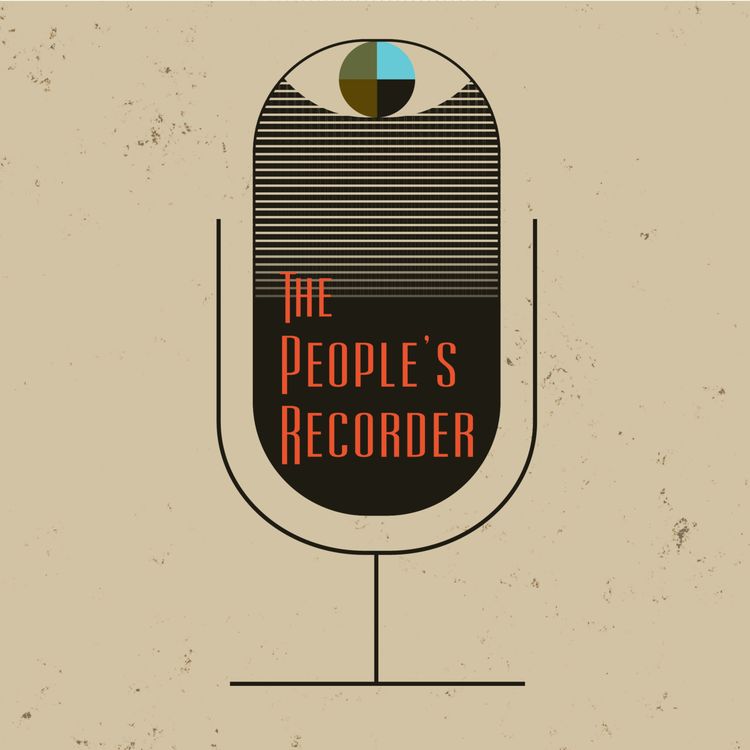
The People's Recorder
09 Is This Land Your Land?
Episode Summary:
This episode features two more stories of outsiders remaking themselves and California history.
Eluard McDaniel left the Jim Crow South for California as a boy, and remade himself as an activist and writer on the West Coast. His account of his life brought him national attention when it appeared in American Stuff, a book of creative works by members of the Federal Writers’ Project and Federal Art Project selected by Henry Alsberg.
Miné Okubo was a rising artist with the Federal Art Project who drew on her art and her life story to depict a hidden history of injustice during World War II in her book Citizen 13660. Even decades later, a culture of silence surrounded that experience – until her book won an American Book Award and became testimony that sought redress for Japanese Americans incarcerated during the war.
Speakers:
David Bradley, novelist
Seiko Buckingham, niece of Miné Okubo
Jeanie Tanaka, niece of Miné Okubo
David Kipen, journalist and author
Links and Resources:
'Citizen 13660" short film by the National Park Service
"Sincerely, Miné Okubo" short film from the Japanese American National Museum
"Pictures of Belonging" 2024 art exhibition
Eluard McDaniel entry, Abraham Lincoln Brigade Archives
Reading List:
Citizen 13660, by Miné Okubo
Miné Okubo: Following Her Own Road, by Greg Robinson
The Dream and the Deal, by Jerre Mangione
“Bumming in California” by Eluard McDaniel, in On the Fly: Hobo Literature and Songs, 1879 – 1941, PM Press
The Chaneysville Incident: A Novel, by David Bradley
Dear California, by David Kipen
Black California, edited by Aparajita Nanda
California in the 1930s: The WPA Guide to the Golden State with introduction, by David Kipen
Credits:
Host: Chris Haley
Director: Andrea Kalin
Producers: Andrea Kalin, David A. Taylor, James Mirabello
Writer: David A. Taylor
Editor: Ethan Oser
Assistant Editor: Amy Young
Story Editor: Michael May
Additional Voices: Jared Buggage, Mariko Miyazaki, Kate Rafter and Amy Young
Featuring music and archival from:
Pete Seeger
Joseph Vitarelli
Bradford Ellis
Pond5
Library of Congress
National Archives and Records Administration
The Ronald Reagan Presidential Library
Manny Harriman Video Oral History Collection, Tamiment Library and Robert F. Wagner Labor Archives, NYU Special Collections.
For additional content, visit peoplesrecorder.info or follow us on social media: @peoplesrecorder
Produced with support from:
National Endowment for the Humanities
California Humanities.
More episodes
View all episodes
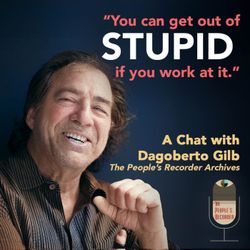
Interview with Dagoberto Gilb
19:06|Episode Summary: Today, we are sharing our never-before-released conversation with award-winning author Dagoberto Gilb. We interviewed Dagoberto for our documentary Soul of a People and were immediately impressed with his way of cutting through pretense with a single line. When we asked him if we could quote him in the outreach for the film, his reply was swift and dry: “Yes, to whatever I said, so long as I look brilliant.” That’s Dagoberto – he disarms with wit, then follows with something unvarnished and true. In our conversation, Dagoberto reminds us that literature, just like life, is at its best when it insists on being true. He isn’t interesting in polishing myths, and he has no patience for stereotypes and cliches. Instead, he’s here to tell us what’s raw, lived and true.To hear the full interview, consider joining our Patreon Community at just $5/month:www.patreon.com/PeoplesRecorderAdditional Links:Learn more about Dagoberto Gilb"A Passing West" by Dagoberto Gilb"New Testaments" by Dagoberto GilbCredits: Host: Chris HaleyDirector and Interviewer: Andrea KalinProducers: Andrea Kalin, David A. Taylor, James MirabelloEditor: Ethan OserFeaturing Music from Matt Cartonis and Pond5For additional content, visit www.peoplesrecorder.info or follow us on social media: @peoplesrecorder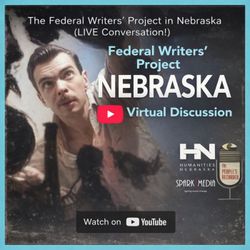
Update: Join us on February 3d for a free virtual discussion! 1:30pm EST
02:00|Join us for a special virtual discussion about the Federal Writers’ Project in Nebraska. Listen to a dynamic panel moderated by The People’s Recorder host and award-winning historian and author Chris Haley.EVENT LINKThe People’s Recorder launched in 2024 and won a 2025 Silver Signal Award for Best History Podcast. Using the 1930s Federal Writers’ Project as a lens to view our past, the podcast asks the questions: how does history get recorded and who gets to decide which history gets told? This special virtual event will build on the discussion started in the podcast, and will further explore the work and literary and cultural legacy of the Federal Writers’ Project in Nebraska.Part of the WPA, the Federal Writers’ Project provided work for unemployed writers, editors, and other white-collar workers during the height of the Great Depression. The Writers’ Project had a mandate to produce state and city travel guides, and interview everyday citizens. It was perhaps the largest and most chaotic publishing venture in American history, and yet it produced over 200 publications, and its flagship travel guide series remains important for its firsthand views of life in America. The Nebraska guide was a notable success and state bestseller. This moderated discussion will focus on the work of the Nebraska Writers’ Project and how that speaks to Nebraskans today. That includes the experiences of Rudolph Umland, a hardscrabble farmer turned editor, Weldon Kees, a hardware businessman’s son turned poet, and Ruby Wilson, a nurse who found a passion for recording first person history. We’ll also shine a light on acclaimed author of the Plains Mari Sandoz and University of Nebraska-Lincoln professor and founder of Prairie Schooner, Lowry Wimberly, whose influence was critical to the Project’s success. This special event is produced with support from Humanities Nebraska in partnership with Prairie Schooner and Lincoln City Libraries.Learn more at https://www.peoplesrecorder.info/humanities-neADDITIONAL LINKS:Event Link - February 3rd at 1:30 pm EST/12:30 pm CSTEvent Landing PageThe People's Recorder Episode 10: A Creative IncubatorHumanities NebraskaPrairie Schooner Lincoln City Libraries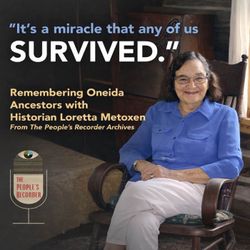
Interview with Loretta Metoxen
17:28|Episode Summary:One of our favorite episodes to work on was “Episode 6: Native Historians do Stand-up” about the WPA project to preserve the Oneida language and history. But that was not the first time we explored this story. We first traveled to Oneida, conducting interviews and digging into archives, when we produced our documentary Soul of a People. One of those interviews was with the remarkable Loretta Metoxen. Until her death in 2021, Metoxen was the Tribal Historian for the Oneida Nation, a position she served in for over two decades. She was tasked with preserving, documenting and interpreting her people’s history, culture, and traditions. Having learned directly from the WPA’s Oscar Archiquette, Metoxen is clear in her reflections on the groundbreaking work of the Oneida writers during the Depression and its huge impact today. To hear the full interview, consider joining our Patreon Community at www.patreon.com/PeoplesRecorderAdditional Links: Learn more about Loretta MetoxenOneida Nation Cultural Heritage WebsiteOneida Books RediscoveredCredits: Director: Andrea KalinInterviewer: Oliver LukacsProducers: Andrea Kalin, David A. Taylor, James MirabelloInterview Re-record and Editor: Ethan OserFeaturing Music from the Oneida Singers and Pond5 For additional content, visit www.peoplesrecorder.info or follow us on social media: @peoplesrecorder
Interview with Studs Terkel
13:57|Episode Summary: Studs Terkel was many things – a Pulitzer Prize-winning author, oral historian, radio legend, fiery populist, labor advocate and, above all, a master listener. For 45 years, his Chicago radio show invited everyday people to share their stories – the kind of history that often gets forgotten. In 2006, we turned the tables and asked Studs to tell us his story. This never-before-released interview was one of his last before his death at age 96. Before we left, he signed our copy of his book about the Depression, Hard Times, with a simple message: “Keep up the good work.” And that’s what we’re trying to do with The People’s Recorder – carry forward Studs’ legacy of person-first storytelling. To hear the full interview, consider joining our Patreon Community at www.patreon.com/PeoplesRecorderFor just $5/month, you can have access to extended interviews, plus upcoming bonus episodes and AMA events. Support us on Patreon and keep these stories coming. Additional Links: Learn more about Studs Terkel Studs Terkel Radio Archives"Working" by Studs Terkel Credits: Host: Chris HaleyDirector and Interviewer: Andrea KalinProducers: Andrea Kalin, David A. Taylor, James MirabelloEditor: Ethan OserFeaturing Music from Pond5For additional content, visit www.peoplesrecorder.info or follow us on social media: @peoplesrecorder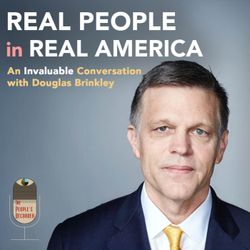
Interview with Douglas Brinkley
19:17|Episode Summary:In 2006, award-winning filmmaker and producer Andrea Kalin sat down for an interview with bestselling author and renowned presidential historian Douglas Brinkley. Together, they discussed the social and political landscape of 1930s America, the Great Depression, and how the New Deal employed writers to document that unique moment in U.S. history. Now, for the first time ever, that insightful and inspiring conversation is available for you to enjoy. To hear the full interview, consider joining our Patreon Community at www.patreon.com/c/PeoplesRecorder.For just $5/month, you can have access to extended interviews, exclusive bonus episodes and Ask Me Anything events. Support us on Patreon and help keep these stories coming. Credits: Director and Interviewer: Andrea Kalin Producers: Andrea Kalin, David A. Taylor, James Mirabello Editor: Ethan Oser Featuring Music from Pond5 For additional content, visit www.peoplesrecorder.info or follow us on social media: @peoplesrecorder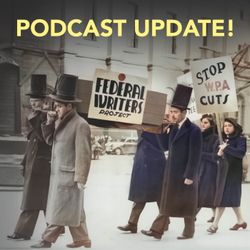
Important Update!
09:10|Episode Summary:Tune in for an important update on The People's Recorder!Host Chris Haley shares the state of the podcast now in the wake of recent funding cuts and also the exciting plans we have coming up over the next few months, including a sneak preview of "Gospel of Fear," our trilogy of episodes about Congressman Martin Dies, the playbook he used to attack the WPA and the Federal Writers' Project, and how we're all still feeling the impact of that playbook today.The People's Recorder is also now on Patreon! Support the podcast and help keep these stories coming and out in the world where they belong. Become a patron for only $5/month and receive access to exclusive interviews, bonus episodes, AMA events, and more!For more information and to sign up, visit: www.patreon.com/peoplesrecorderImage Description and Credit: Protestors in Center City Philadelphia, 1939, staging a symbolic "funeral" for the Federal Writers' Project, a Works Progress Administration program soon to be gutted by federal budget cuts. From the Historical Society of Pennsylvania.Episode Credits: Director: Andrea KalinProducers: Andrea Kalin, David A. Taylor, James MirabelloEditor: Ethan OserFeaturing Music from Pond5For additional content, visit www.peoplesrecorder.info or follow us on social media: @peoplesrecorder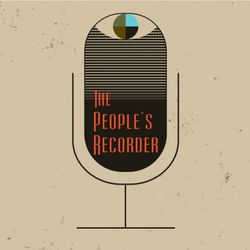
Bonus Content - Pictures of Belonging
07:42|Episodes Summary: A beautiful and powerful art exhibition is touring the country right now, called Pictures of Belonging, which explores three artists of Japanese descent - Miki Hayakawa, Hisako Hibi and Miné Okubo. The exhibition puts these artists and their work in their rightful place in the history of American art. For this bonus episode, producer and lead writer David Taylor visits the exhibition at the Smithsonian American Art Museum and shares his insights about Miné Okubo, who was featured in Episode 9: Is This Land Your Land? She was a painter who was working with Diego Rivera on murals for the WPA when she was detained and sent to an incarceration camp during World War 2. She used her artwork to bear witness to the mass incarceration of Japanese Americans during the war. Links and Resources:Pictures of Belonging: Japanese American National MuseumPictures of Belonging: Smithsonian American Art MuseumCitizen 13660 - a short film from the National Park ServiceSincerely, Miné Okubo - a short biography from the Japanese American National MuseumFurther Reading: Citizen 13360 by Miné OkuboMiné Okubo: Following Her Own Road by Greg Robinson Peaceful Painter: Memoirs of an Issei Woman Artist by Hisako HibiThe Other American Moderns: Matsura, Ishigaki, Nora, Hayakawa by ShiPu WangCredits: Director: Andrea KalinProducers: Andrea Kalin, David A. Taylor, James MirabelloEditor: Amy YoungFeaturing music from Pond5Produced with support from the National Endowment for the Humanities, Florida Humanities, Virginia Humanities, Wisconsin Humanities, California Humanities and Humanities Nebraska. For additional content, visit peoplesrecorder.info or follow us on social media: @peoplesrecorder
Human Powered: Art Against the Odds
44:35|The People’s Recorder was funded in part with a grant from Wisconsin Humanities. But did you know that Wisconsin Humanities also has their own podcast, Human Powered? Hosted by Adam Carr and Dasha Kelly Hamilton, Human Powered focuses on the power of the humanities in Wisconsin's prisons. We wanted to share an episode from that terrific show with you today. People in prisons are cut off from their families, their communities, and in some cases their own feelings. Making art in prison can be a way to affirm your humanity in a place that is often dehumanizing. So, when organizers of an exhibit of prison art put out a call for submissions, they were flooded with responses from incarcerated artists working without support, formal programs or materials. This episode tells the story of that exhibit. Guests: Joshua GreslJohn TysonSarah DemerathDebra BrehmerLearn more about Human Powered at www.wisconsinhumanities.org/podcast
10. 10 A Creative Incubator
40:04||Season 1, Ep. 10Episode Summary:In the 1930s, the notion of making an incubator for creativity in a region devastated by the Great Depression got tested in Nebraska. This episode looks at what happened there when the Writers’ Project came to town, through a group of creatives from contrasting backgrounds, including a hobo, a nurse and a hardware store poet – all under the watchful eye of a university professor and a celebrated novelist. Starting from chaos, they ignited a surprising alchemy and made the Lincoln office one of the most productive Writers’ Project hubs in the country. The Season 1 finale listens in as Americans face war clouds on the horizon, and a national radio show asks, “Can we count on youth to uphold the American Way?”Speakers: Stephen Cloyd, librarian and historianMarilyn Holt, historianJames Reidel, biographer and poetDouglas Brinkley, historianLinks and Resources: Rudolph Umland and the Federal Writers' ProjectThe Nebraska Federal Writers' Project - Lincoln City LibrariesMari Sandoz and the Writers' ProjectWeldon Kees reads his poem, "1926"WPA Guide to Nebraska (free PDF)Prairie SchoonerReading List: Vanished Act: The Life and Art of Weldon Kees, by James ReidelNebraska During the New Deal, by Marilyn Irvin HoltSoul of a People by David A. TaylorThe Worst Hard Time: The Untold Story of Those Who Survived the Great American Dust Bowl, by Timothy EganThe Collected Poems of Weldon Kees, edited by Donald JusticeCrazy Horse, by Mari SandozCreditsHost: Chris HaleyDirector: Andrea KalinProducers: Andrea Kalin, David A. Taylor, James MirabelloWriter: David A. TaylorEditor: Ethan OserAssistant Editor: Amy YoungStory Editor: Michael MayAdditional Voices: Jared Buggage, Sam Hanks, JoJo Drake Kalin, Antonio Macias, James Mirabello, Mariko Miyazaki, Kate Rafter and Sarah SmackFeaturing music and archival from: Aaron CoplandAlexandria Symphony OrchestraJoseph VitarelliBradford EllisMike SayreCeiri TorjussenPond5Library of CongressNational Archives and Records AdministrationNew York Public Radio Archives CollectionNebraska Public MediaFor additional content, visit peoplesrecorder.info or follow us on social media: @peoplesrecorderProduced with support from: National Endowment for the HumanitiesHumanities Nebraska